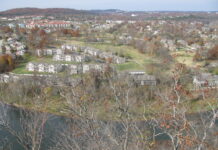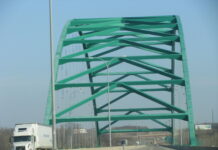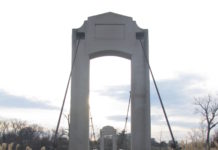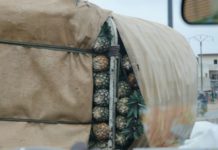Photo credit: DiasporaEngager (www.DiasporaEngager.com).
A “Safe Space” like this one in Durbanville is planned for Muizenberg. Archive photo: Ashraf Hendricks
- Muizenberg is to get a 60-bed “Safe Space” shelter for homeless people.
- The shelter will be co-funded and operated by the City of Cape Town and U-turn.
- A site is still to be finalised.
Funding has been approved to create a new shelter for homeless people in Muizenberg, Cape Town. This will be the sixth “Safe Space” in the city.
The City of Cape Town says the Mayoral Fund will contribute R4-million for the shelter and welfare organisation U-turn will raise a further R4-million from donors.
The shelter will be operated in partnership with U-turn, which already operates a shelter in Claremont and offers social services and meals at several centres in the city.
A site for the shelter is still to be finalised, after which a public participation process will begin.
The City told GroundUp, “Every area in Cape Town that experiences the challenges faced by homeless people needs a transitional safe space for their relocation out of public places, off the streets and back into society.”
The City’s Safe Space programme offers two meals a day and access to social workers, skills training, work placement and family reunification.
“We need something in the area,” said U-turn CEO Jean-Ray Knighton Fitt.
He said U-turn wants to develop a more “comprehensive response to homelessness across the city”.
Fitt said that the shelter is expected to have 60 beds, with separate dormitories for men and women. Children will not be accommodated, but an emergency unit for families is under consideration. When GroundUp asked Fitt about dogs, he said pets are not part of the plan, though this is an issue which frequently comes up at U-turn.
Fitt says the shelter has been met with resistance from some Muizenberg residents. Some think the safe space will attract more homeless people, when in fact “we’re taking people off the streets”. With access to a shelter, he says, homeless people will not have to be “fighting for survival” and will be more likely to be able to move off the streets.
“Off the streets in the day. Off the streets in the night … and ultimately, off the streets in the long term,” he said.
Fitt estimates that there are between 400 and 500 homeless people between Retreat and Fish Hoek. He hopes that the safe space will be completed by the end of the year, as this will “make a big impact on the Muizenberg area”.
“Community engagement will make or break this project,” said Simon Roberts, chair of the Muizenberg Improvement District (MID). He said the MID supports the shelter but a site should be chosen that does not affect tourism or local economic activity. The MID has suggested that the site should be chosen through a public participation process and a data-driven approach.
GroundUp spoke to people who came for lunch at the U-turn Service Centre in Muizenberg.
Geremy Gordon said he has been living in the mountains in Muizenberg for 15 years and has never been to a shelter as they are always full. He said a shelter in Muizenberg “will be great” and he will use it.
Logan Patel, who is no longer homeless, said she stayed in shelters several times and it was helpful. “There are a lot of people who are trying to get out and there are no spaces in the shelters,” she said.
The other City-run Safe Spaces include one in Durbanville, one in Bellville, and two in Culemborg. A new shelter is to open in Greenpoint in July. There are 37 shelters registered on the Western Cape government website.
© 2024 GroundUp. This article is licensed under a Creative Commons Attribution-NoDerivatives 4.0 International License.
You may republish this article, so long as you credit the authors and GroundUp, and do not change the text. Please include a link back to the original article.
We put an invisible pixel in the article so that we can count traffic to republishers. All analytics tools are solely on our servers. We do not give our logs to any third party. Logs are deleted after two weeks. We do not use any IP address identifying information except to count regional traffic. We are solely interested in counting hits, not tracking users. If you republish, please do not delete the invisible pixel.
Source of original article: GroundUp News (www.groundup.org.za).
The content of this article does not necessarily reflect the views or opinion of Global Diaspora News (www.GlobalDiasporaNews.com).
To submit your press release: (https://www.GlobalDiasporaNews.com/pr).
To advertise on Global Diaspora News: (www.GlobalDiasporaNews.com/ads).
Sign up to Global Diaspora News newsletter (https://www.GlobalDiasporaNews.com/newsletter/) to start receiving updates and opportunities directly in your email inbox for free.
































